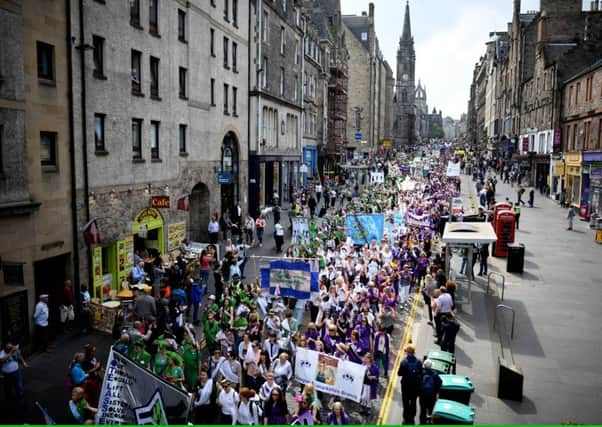Kezia Dugdale: Keep marching, ladies'“ we're not there yet


On closer inspection, many of those marching were wearing the full dress of the day: starched cotton blouses with frills at the neck and dainty buttons; long-flowing skirts and delicate woven hats to keep the sun away.
Together the marches wove one large sash of suffragette across the United Kingdom. Some marched in celebration, others in anger; for there remains a lot to be angry about.
Advertisement
Hide AdAdvertisement
Hide AdWhat would Emily Wilding Davison, or Millicent Fawcett have made of the progress we’ve made? Might they have hoped for full equality by now?
Last week I was asked what I thought the single most significant development for gender equality was and I was quick to answer. It wasn’t the vote, or access to contraception, maternity leave or anti-discrimination laws – all wonderful and welcome things.
No, for me the answer had to be financial independence. Women came through the Swinging Sixties and a decade of free love without it. It wasn’t until 1975 that women were able to access mortgages in their own name rather than simply jointly with their husbands. The Seventies also saw the death of the idea that women had to stop working when they got married.
Financial independence is key because that’s what gave women choices and freedoms. But even today not all women have that independence. Think of the women in controlling relationships, whose husbands or partners command the purse strings; demanding receipts and issuing pocket money.
Advertisement
Hide AdAdvertisement
Hide AdThat type of coercive control has only become a criminal offence in the past few months thanks to the efforts of the Scottish Government and women’s organisations.
Austerity keeps women dependent on their partners too, or if they’re single it keeps them poor. There are women in this city holding down part-time jobs for less than the living wage, spending more on bus fares and childcare than they can on themselves. There’s still a long way to go for full gender equality.
Much has been made in recent times of the need for equality in the boardroom of our big companies. And we’ve seen progress here to make the Pankhursts proud, with the UK Government demanding the publication of the ‘pay gap’ in major corporations and institutions across the land.
It’s brought shame to the BBC and forced well-known companies to explain why they’re more likely to promote men and indeed pay them more for the same work.
Advertisement
Hide AdAdvertisement
Hide AdTo add insult to injury, only last week we saw a top ten list of excuses from company executives as to why women aren’t the ‘right fit’ for high office. But it’s not just a seat at the table that women demand; they demand equal pay.
Despite 40 years passing since Barbara Castle’s famous Equal Pay Act, women still find themselves earning less than men for the same work – whether it’s council dinner ladies, who are finally getting their just rewards, or the female prisons officers who just yesterday learned they are getting £4000 each to settle the discrepancy.
More than 20 per cent of people in our great city work in finance. You’ll find women in the boardrooms here. Not enough of them, but they are there. What you won’t find though is a true picture of the pay gap. Why? Because bonuses don’t count in the official calculations.
A pay gap of 25 per cent can rise to as high as 45 per cent once you factor that in, but it’s not in the official numbers. It’s a hidden pay boon for men in the finance sector and even some of the most powerful, talented and well-heeled women are still losing out. It’s still a man’s world alright, and that’s why we’ll keep marching.